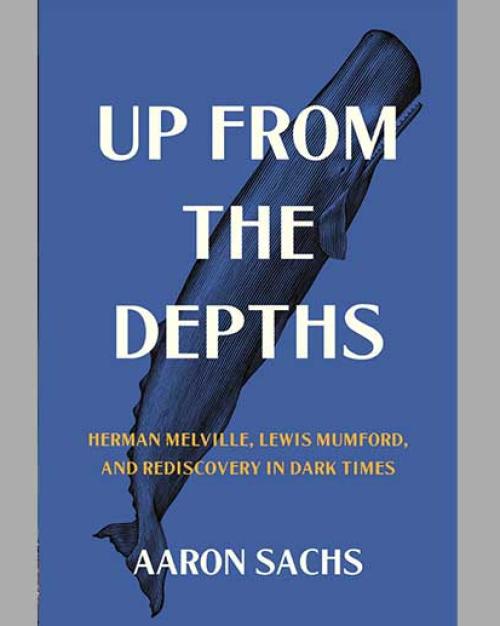Some years ago – never mind how long precisely – Aaron Sachs, browsing an Ithaca library book sale as a way of driving off the spleen and regulating circulation, stumbled upon a biography of Herman Melville that he hadn’t known about.
The 1929 work by the literary critic and historian Lewis Mumford had helped revive Melville from obscurity. And Sachs, a history professor in the College of Arts and Sciences, came to learn that Mumford – best known for his critiques of cities and technology – had remained obsessed with Melville as he responded to the recurring crises of his time, including two world wars, the Great Depression, McCarthyism and the Vietnam War.
“He was going back to Melville to help him understand and cope with those dark times,” Sachs said. “That was very interesting to me historically, but also felt very relevant to the 21st century and the dark times we’ve been coping with.”
Sachs’ new book, “Up from the Depths: Herman Melville, Lewis Mumford, and Rediscovery in Dark Times,” published June 7, tells the interconnected stories of the two important American writers, arguing that they show us how history can offer hope amid darkness.
Sachs discussed the book with the Chronicle.
Question: How did discovering Mumford’s biography of Melville influence your historical thinking?
Answer: I got interested in the Melville Revival and wanted to understand better why Americans in the 1920s, and through the 30s and 40s, were so captivated by this incredibly dark writer from the previous century. Mumford was active as an intellectual during periods of the 20th century that got very dark, and anchored his faith in Melville. That spurred thoughts about cycles of history and the dialectic between continuity and change. Our culture constantly is telling us we’re going through something “unprecedented,” as with the pandemic. I understand what people mean, but Mumford and Melville would just scoff at that idea. They were so keenly aware of the massive challenges Western society has always had to deal with.
Q. One of those seemingly unprecedented challenges today is the environment and climate change, which you’ve studied extensively.
A. In many ways this is under the surface a book about climate change. Our constant focus on the future in terms of impending doom and the technological innovations that are going to get us out of this mess – that’s wrong. What could actually help us is looking at the past. The structures of colonialism and industrial capitalism have been in place for hundreds of years now and caused massive injustices, and we need to confront that honestly.
Q: Why was Mumford’s interpretation of Melville important?
A: He placed Melville in a historical context about what was happening in American society during those decades, which was basically modernization. He led the way in understanding Melville much more as a constructive critic of his time, someone who was not beaten down and demoralized but who continued actively responding to his historical circumstances in important ways. Mumford also had the critical insight that Melville’s darkness was balanced by inspiring determination and perseverance.
Q. Why do you suggest it’s a good time for a Mumford Revival?
A. Mumford was committed throughout his career to confronting the darkness of Western civilization, but without just condemning it out of hand, always trying to find the countercurrents. He would show that there were always people fighting against industrial capitalism, trying to remind people that this particular type of modernity was not inevitable, that human beings are agents, and they can reshape society.
Q. Is that what your title, “Up from the Depths,” is getting at?
A. It’s meant to evoke this idea that you do have to dive into the Melvillian abyss, you always have to reckon with the darkness, you always have to renegotiate your relationship to the past. But that doesn’t mean you just keep sinking down into the ocean. There’s always the possibility of rising up.
Q. You open the first chapter noting that there aren’t many optimistic historians. Are you one?
A. It’s important to distinguish between optimism and hope. A true optimist thinks everything is going to turn out well, and no historian could legitimately feel that way based on the consistent record of horrors that humans have perpetrated. But it’s possible to be hopeful, because the future is always uncertain. There are a lot of different ways that things could go and some of them are positive. The spirit of Melville and Mumford that I’m trying to echo is to have a very real confrontation with the horrors, and then come out of the abyss and try to make something constructive out of the realities that exist.
Q. The book alternates between chapters about Mumford and Melville. As someone who thinks a lot about the writing of history, why did you choose that storytelling structure?
A. Creative writing is really at the heart of what I do. My hope is that the structure of this book helps readers experience the interweaving of past and present, helps give them a very visceral sense that we need to understand history as both change and continuity. It’s hard to have that feeling in this day and age, when everything around us is telling us that it’s only about change and linearity and progress. I’m a big believer in the possibility of art to change people.
Read the story in the Cornell Chronicle.




